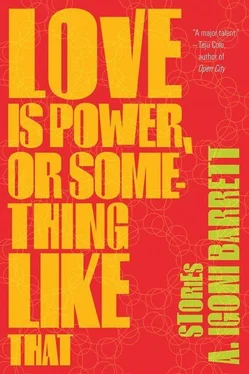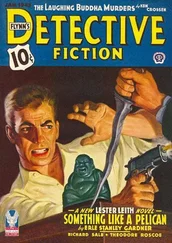
By the time the fear that combusted in his belly had been exhausted, Dimié Abrakasa was far from the alley, the boys, and the marketplace. He leaned against the rusting frame of an electrical pole and struggled to regain his breath. His chest heaved and fell. His hands clutched at his throat and clawed at the neck of his T-shirt, smudging the yellow. His eyes darted, searching for the pursuer who had laid grip of his imagination. Passersby slowed as they approached, shot him curious glances, and then hurried past.
.5 .
Dimié Abrakasa was back on Ernest Ikoli Road, at Railway Junction, when the rainclouds caught the sun. The world turned gray, the temperature plummeted, and gusts of wind sprang up. The wind grew stronger and flung dust into the air. A lightning flash split the gloom and a rumble of cascading boulders burst from the skies. Another flash, sulphuric in its intensity — the thunderclap was like a shredding of the heavens.
Birds crawled across the sky with panicked cries. There was a lull, everything froze in that instant; and then, with a sound like burning grass, rain fell. The raindrops had not made landfall when a bolt of blue-white lightning, like a forked tongue, streaked the sky, and one of its prongs struck a fleeing swallow. The bird stalled in midflight, then began to tumble earthward as the rain hit the ground.
Through sheets of crashing water, pedestrians sprinted for cover. Puddles formed on the sidewalks, then flowed together and rushed for the drains, which brimmed over and poured water onto the road. The road became a river. Car engines drank water, coughed out steam, and died. Both sides of the road — and the sidewalks, too — got jammed. The horn blares of motorists became one long, unbroken blast.

Dimié Abrakasa moved off the sidewalk onto the road and wove through the stalled cars. The bonnet of the Toyota Sequoia beside him was warm — the car was empty but the engine was running. The driver had alighted and rushed off to join the crowd that was gathered at the head of the traffic jam.
Dimié Abrakasa headed for the crowd and squeezed through the swarming bodies till he reached the front, where there was a large flooded pothole. The obstructed traffic was caused by a ramshackle, cattle-hauling lorry that had tried to charge across the pothole. The lorry was stuck. The lorry driver was on his knees in the tea-colored water, scooping handfuls of mud from under the lorry’s tires. Water lapped against his chest.
Like wind in the treetops, loud voices swept through the crowd, arguing. Some urged that the lorry be pushed aside, and others recommended a detour round it. Dimié Abrakasa watched, fascinated, as the crowd split into factions and yelled in each other’s faces. Two traffic wardens and a policeman stood in the crowd. One of the wardens gaped at the angry faces with his hands clasped behind his head, while the second man glared at the lorry, his features drawn into a scowl. The policeman tried to arbitrate contending views, but he was repaid for his efforts by getting sucked into a quarrel that grew so heated he had to flash his handcuffs to extricate himself.
From the edge of the crowd, someone yelled: “Thank God — the army has come!”
A column of soldiers approached at a trot, their bootheels drumming the road. The crowd parted before them, scrambling out of their path. When they arrived at the obstruction, their leader — a stocky, potbellied sergeant who bore on both cheeks the four slashes that was the mark of Egba nobility — bellowed, “Qua Shun!” The soldiers stood at attention. Each held a horsewhip in one hand and an assault rifle in the other. Twirling his whip as he turned to the crowd, the sergeant ordered, “All civilians clear the area, now! ”
The crowd dispersed. There was a flurry of banging car doors.
The traffic wardens had fled, but the policeman stood his ground. Thrusting out his chest, he walked up to the army sergeant, who turned to face him, surprise written across his face.
“Sergeant, sah!” the policeman said, saluting, “the situation on ground—”
The sergeant interrupted him. “What situation?”
The policeman, who towered over the sergeant, leaned forward with a wide smile. “The lorry responsible for this wahala. .”
“Are you a soldier?” the sergeant asked.
“No, sah, but—”
“Are you a retired soldier?”
“No, sah.” The policeman began to fidget.
“Is your wife a soldier?”
“No!”
The policeman, glancing around at the column of stonefaced soldiers when he made his reply, did not see the twist of rage on the sergeant’s face as he roared, “Bloody civilian!” and dealt the policeman a sledgehammer blow to the throat. The policeman fell to the ground, jerking as he fought to keep from swallowing his tongue. Grasping the fallen man by the collar, the sergeant slashed him across the face with his whip, then dragged him to the edge of the flooded pit, released him, and stepped back a pace. The sergeant’s face regained its humanity.
“Roll in the mud, you shit,” he said, calmly.
Trembling from fear and pain, and bleeding from the cut to his face, the policeman squeezed his eyes shut and crawled into the pool of muddy water. He lay down on his belly, bobbed for an instant, and then began to roll, the water rippling. The sergeant hung his whip round his neck and, with deliberate slowness, folded his sleeves. When he was done, he said, his voice barely above a whisper: “Out.”
The policeman scrambled out of the water on all fours, gasping for air. The sergeant turned to his men and ordered, “Clear that lorry from the road.”
The soldiers leaped into action. They beat up the lorry driver and then offloaded his cargo of cattle, which they sent galloping off with kicks to their rumps. Then they strode through the crowd, handpicking hefty men. The men pulled the lorry, and the soldiers pushed. The sergeant directed the traffic, his whip flailing as he yelled instructions. In a few minutes the cars were honking their thanks and speeding off.

The rain had stopped. Dimié Abrakasa was wet, hungry, and tired. He had been gone too long — Méneia and Benaebi would be waiting for him, maybe even now watching both ends of the street to see who would spot him first. Then his thoughts were interrupted by the sound of his name. He looked up and saw a sea of cars. Dimi! he heard again, above the noise of the engines. He saw the waving hand and recognized the car — a decrepit white Peugeot 404—and then the face of his landlord, Alhaji Tajudeen. The landlord was pushing the car with one hand and controlling the steering wheel with the other. The line of cars behind him honked at his slow progress. Dimié Abrakasa ran to help him.
“Afternoon, sir,” he greeted. He moved to the back of the car. They pushed together. The car rolled faster.
“Can you push alone?” Alhaji Tajudeen asked, looking over his shoulder.
“Yes,” Dimié Abrakasa answered.
“Okay.” Alhaji Tajudeen jumped into the driver’s seat and pulled the door shut.
“Push! Push!”
Dimié Abrakasa bit his lip; his feet scrabbled on the rain-slick tarmac.
“Come on, you’re not a woman— push! ”
The exhaust backfired with a blast of thick, white smoke. The engine caught, sputtered, and sparked into life. Dimié Abrakasa, his face shining with sweat, ran toward the passenger door. He was reaching for the handle when the car swerved into the hooting, fast-flowing traffic and sped off. Dimié Abrakasa stood clutching the air. And then he scrambled off the road.
Читать дальше


![Сьюзан Кейн - Quiet [The Power of Introverts in a World That Can't Stop Talking]](/books/33084/syuzan-kejn-quiet-the-power-of-introverts-in-a-wo-thumb.webp)










